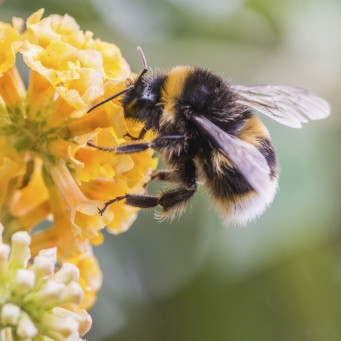Buzzing to save bees
Date published: 27 August 2014
Safeguarding measures have been put in place to protect bee colonies, which are responsible for pollinating around 80 per cent of our food and are increasingly in danger of extinction.
Over the last few decades there has been a 60 per cent decline in the number of bees recorded in the UK, due to unsustainable agriculture, diseases and habitat degradation.
The problem is thought to be so severe that the UK Government launched an “urgent and comprehensive” review in 2013, with the findings influencing a new ‘national pollinator strategy.'
In Rochdale borough the Friends of Hopwood Park have created an insect hibernation hotel and wildflower meadow, with the aid of council rangers, while the Balderstone Park Friends were supported in their pursuit of a lottery grant for a wet-wildflower meadow.
Sandra Trickett, the chairperson of the Friends of Hopwood Park, said: “The wildflower meadow at Hopwood has brought a significant increase in both bee and butterfly population. Prior to the meadow it was rare to see any wildlife but now it is highly populated with bees.
"The bug hotel is relatively new and we’re still waiting for residents to move in.”
KESRA community group in Milkstone and Deeplish created a wildflower meadow and an area of herbaceous flowers, which have become a year round nectar source for bees.
The borough’s youngsters have also been encouraged to bee-lieve in the importance of a healthy bee population by council rangers. Along with leading regular community bee-promotion activities, the rangers have developed a ‘Bernard Bee’ engagement pack, to be used as a school learning aid.
Rochdale Borough Council is playing its part.
Council Leader, Councillor Richard Farnell said: “The bee population is vital to the sustainability of the environment, with a single bee colony capable of pollinating around 300 million flowers a day. It’s unlikely that humans could survive a total bee collapse.
"The Environmental Management service has been implementing measures designed to preserve the bee population and I encourage residents and businesses to do the same.”
Councillor Jacqui Beswick, Cabinet Member for Housing and Environment, added: “Environmental Management also limits its pesticide use to where it is absolutely essential and reviews this in accordance with new legislation, on an annual basis.”
Information and commitments on habitat management, for a variety of wildlife including bees, is soon to be published in the councils’ Park and Open Spaces Strategy.
Lucy Rothstein, Chief Executive of the Bumblebee Conservation Trust (BBCT), said: "We applaud the good work of this council and are keen to encourage more to follow its lead.
“The Bumblebee Conservation Trust was established because of serious concerns about the 'plight of the bumblebee'. In the last 80 years our bumblebee populations have crashed. Two species have become nationally extinct and several others have declined dramatically.”
For more information on how you can promote a healthy bee population contact the Council Environmental Management Team:
environmentalmanagment@rochdale.gov.uk
0300 303 8844
Do you have a story for us?
Let us know by emailing news@rochdaleonline.co.uk
All contact will be treated in confidence.
Most Viewed News Stories
- 1Royton haulage firm fined after Rochdale dad went to work and didn’t come home
- 2Six men arrested in Rochdale child exploitation investigation
- 3Rochdale church to host Camerados public living room
- 4Suspended council candidate was ‘politically naive’ for appearing in George Galloway video, leader...
- 530 years of the GEM Appeal, a Rochdale-founded charity that has raised millions and changed the...
To contact the Rochdale Online news desk, email news@rochdaleonline.co.uk or visit our news submission page.
To get the latest news on your desktop or mobile, follow Rochdale Online on Twitter and Facebook.



